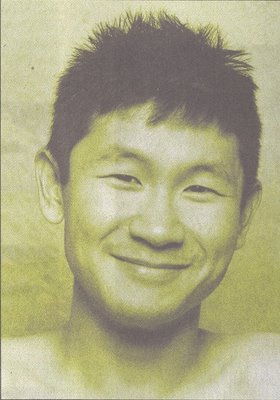>theatre
The Train
Cho-In Theatre
Esplanade Theatre Studio
Saturday [23 June 2007]
Ng Yi-Sheng
This review was first published in the Straits Times Life! Section circa Tuesday 26 June 2007.
Back in 1998, director Park Chung-euy began to develop a new style of drama, drawing from both Korean traditions of masked dance and modern Western techniques of physical theatre. The Train was his first production using this new dramatic language, and it remains effective after nine years: a bittersweet tale of hope and desperation, told through mime and music.
The play is set in a train station during wartime. An old magician and his wife arrive in tattered hanboks, eager to flee the surroundings, but they find they have lost their tickets and must beg alongside the two orphan children who live there.
Although the narrative is slow up to this point, it picks up as the train unloads its passengers and the four characters compete as beggars – the mad scramble for tricks to hold the attention of the different passers-by allows the accomplished cast of seven to excel at their feats of acrobatics and clowning, amusing child and adult alike in the audience.
But The Train – despite its billing as a mime performance – is not a work of children’s theatre. Darker elements are present: the train passengers include lecherous sailors, corrupt colonels, even a terrorist holding a bomb in the shape of the Earth. Suffering is evident in the quiet agony of the old magician as he slowly, painstakingly stands on his head to earn a spectator’s coin. Even prostitution is hinted at, as the females try to pretty themselves up for the passers-by. Most nightmarish is the figure of the pimp - a woman in boots, cracking a whip, who extorts the children’s money and physically abuses them. Poverty is not merely material for laughter here; it is genuinely frightening.
There is thus a darkness that suffuses this play, as the beggars wait in despair as the trains, with all their promise of escape, enter and leave the station, attended by sinister, faceless conductors. Yet there is also a great spirit of hope and redemption, as the magicians use music to revive the abused children, and demonstrate forgiveness to even the pimp.
Cho-In Theatre has achieved a strangely beautiful fusion of several things in this piece: here is the subtlety and intelligence of social realism blended with the untempered joy and terror of pantomime; the grand scope of epic theatre beside the gentle goofiness of slapstick. Certainly, Park’s new theatrical style has the power to move.
Saturday, June 23, 2007
Subscribe to:
Post Comments (Atom)

No comments:
Post a Comment